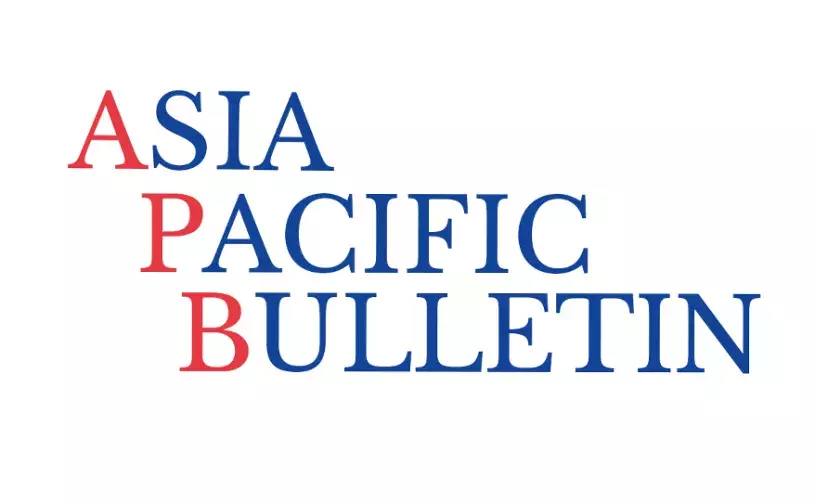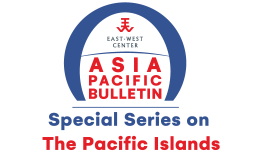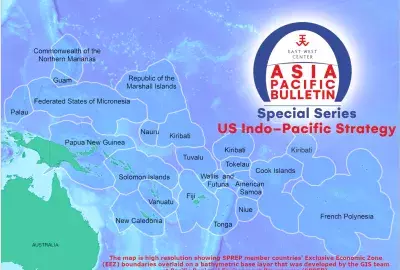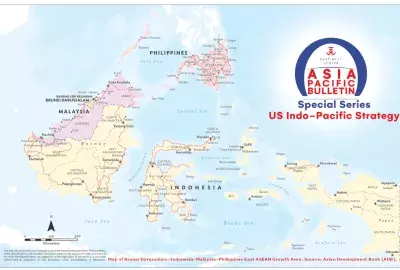Error message


Dr. Gonzaga Puas, Professor at Pacific Islands University and Founder of Micronesia Institute of Research and Development, explains that the Federated States of Micronesia (FSM) is at a "junction, where the confluence of the two super-powers [the United States and China] meet... FSM is aware of its strategic importance and is judiciously managing the influence of both superpowers." |
In April 2022, copies of a draft communiqué outlining a five-year action plan was distributed by Beijing to ten Pacific nations ahead of the Pacific foreign ministers meeting on 30 May. In response the President of the Federated States of Micronesia (FSM), David Panuelo, dismissed China’s draft communique` by a letter addressed to the ten Pacific leaders. Panuelo opposed China’s plan to reshape the Pacific on the basis that it could potentially steer the Pacific into a new cold war. Panuelo’s letter also represents a flashpoint in Chinese–US relations vis-à-vis the FSM. By implication the letter also undermined the bilateral relations between China and the FSM.
The United States has a long-standing relationship with the FSM and continues to defend its interests under the treaty of the Compact of Free Association (Compact). The Compact is a bilateral treaty between the United States and FSM arising from shared historical experiences post WWII. It was first implemented in 1986, renegotiated in 2001, and extended to 2023. The terms of the Compact provides billions of dollars in US financial assistance to the FSM Government in return for having the exclusive right to protect the island’s security interests. The FSM is currently negotiating the Compact to secure increased US financial assistance in order to sustain itself post 2023. China, some have argued, will fill the economic gap should the United States not provide a suitable financial package to meet the growing economic needs of FSM.
The FSM is at a junction, where the confluence of the two super-powers meet. As such it is exercising due diligence in conducting its foreign affairs policy. The FSM is aware of its strategic importance and is judiciously managing the influence of both superpowers. China’s increasing presence in the FSM has raised concerns over its long-term objectives. The FSM has stated on many occasions that its relationship with China is based on economic interests and should not be perceived as a threat to US security interests. Notwithstanding FSM assertions, the United States under the Compact has the right to deny the FSM from engaging in undesirable external relations if the United States perceives that its interests are under threat. However, invoking this provision of the Compact will require approval under the FSM Constitution. As the Constitution states, “the Constitution is the expression of the sovereignty of the people and is the supreme law of the Federated States of Micronesia. An act of the government in conflict with this constitution is invalid to the extent of conflict”. However, external pressure can be imposed on national politicians to try to accommodate the specific needs of the United States.
China is seen as a growing threat due to its ideological practices, which do not align with the “democratic values” of Pacific Island nations. In April, the Solomon Islands entered into an agreement with China . Australia and New Zealand have express concerns that this pact will allow China to build a military base too close to their shores. Recent speculation about the security implications of this agreement have reignited fears that China is accelerating its ambition to re-shape the Pacific. The Prime Minister of Solomon Islands, Manasseh Sokavare, has assured the two metropolitan nations that the agreement is aimed to maximize the island nation’s capacity to deal with its homegrown security issues. Many Pacific scholars are critical of the fear mongering against China. They question whether this recent China-phobia is real, imagined, or somehow exaggerated.
Pacific Island nations have been reassessing their relations with the traditional powers of the Pacific. They are asserting their independence without fear of external interference. Regional and subregional organizations such as the Pacific Islands Forum (PIF), the Melanesian Spearhead Group (MSG) and Micronesian Presidents’ Summit (MPS) are examples of the Pacific nations’ emerging assertiveness to control their own future. Like most developing nations, the Island states aim to raise the living standards of their citizens who have been trapped in a cycle of under development caused by external powers. While traditional powers, such as Australia, New Zealand, and the United States, have provided aid assistance to the Pacific Islands, the conditions attached to this assistance often serve to advance the interests of the traditional powers. This dynamic has resulted in band aid solutions because the trickle-down economic effect remains in the control of external powers. This external control creates deep resentment in Pacific nations. It is one reason why the developing states of the pacific look elsewhere to break the cycle of economic hardship and poverty experienced by their citizens. It is within this context that the FSM, like the Solomon Islands, continues to seek economic assistance from non-traditional partners such as China, to enhance future development objectives.
Foreign Policy
FSM’s foreign policy is dictated by its constitution. It says, the FSM extend(s) “to all nations what it seeks from each: peace, friendship, cooperation, and love in our common humanity.” This policy is deliberate in its design for the purpose of portraying an image of neutrality to promote FSM’s own interests with both Western and other countries. The desire is to diversify FSM’s diplomatic relations with different nations such as China and India for development purposes FSM is acutely aware of the interdependency between nations and therefore makes the effort to increase its diplomatic relations globally. China is a development partner and offers potential economic opportunities for the FSM. It is seen as a powerhouse of ideas that are influencing the world, like the United States after WWII.
The current challenge for FSM is to extend the duration of the Compact and to seek greater financial assistance in order to improve the livelihood of its citizens.
The FSM does not favor China over the US, but rather aspires to have these two super-powers working together in its jurisdiction for the purpose of improving the livelihood of FSM citizens through economic and political cooperation. The FSM will always be in someone else's future strategic plan and the leaders of the nation are acutely aware of this fact.
Conclusion
China–phobia is reminiscent of the Cold War era when the former Soviet Union and the United States competed in the Pacific. China’s approach to Pacific Island Nations, befits its rising image as an international power. The fear of China is largely induced by foreign perceptions. Many perceive the antagonism towards China as part of a concerted effort by the traditional powers to maintain their current level of influence over Pacific Island nations. The future of the FSM depends on its own understanding of how valuable it is to the outside world, and how it can empower itself to engage in mutually respectful dialogue with the two superpowers.

Dr. Gonzaga Puas, Professor at Pacific Islands University and Founder of Micronesia Institute of Research and Development, explains that the Federated States of Micronesia (FSM) is at a "junction, where the confluence of the two super-powers [the United States and China] meet... FSM is aware of its strategic importance and is judiciously managing the influence of both superpowers." |
In April 2022, copies of a draft communiqué outlining a five-year action plan was distributed by Beijing to ten Pacific nations ahead of the Pacific foreign ministers meeting on 30 May. In response the President of the Federated States of Micronesia (FSM), David Panuelo, dismissed China’s draft communique` by a letter addressed to the ten Pacific leaders. Panuelo opposed China’s plan to reshape the Pacific on the basis that it could potentially steer the Pacific into a new cold war. Panuelo’s letter also represents a flashpoint in Chinese–US relations vis-à-vis the FSM. By implication the letter also undermined the bilateral relations between China and the FSM.
The United States has a long-standing relationship with the FSM and continues to defend its interests under the treaty of the Compact of Free Association (Compact). The Compact is a bilateral treaty between the United States and FSM arising from shared historical experiences post WWII. It was first implemented in 1986, renegotiated in 2001, and extended to 2023. The terms of the Compact provides billions of dollars in US financial assistance to the FSM Government in return for having the exclusive right to protect the island’s security interests. The FSM is currently negotiating the Compact to secure increased US financial assistance in order to sustain itself post 2023. China, some have argued, will fill the economic gap should the United States not provide a suitable financial package to meet the growing economic needs of FSM.
The FSM is at a junction, where the confluence of the two super-powers meet. As such it is exercising due diligence in conducting its foreign affairs policy. The FSM is aware of its strategic importance and is judiciously managing the influence of both superpowers. China’s increasing presence in the FSM has raised concerns over its long-term objectives. The FSM has stated on many occasions that its relationship with China is based on economic interests and should not be perceived as a threat to US security interests. Notwithstanding FSM assertions, the United States under the Compact has the right to deny the FSM from engaging in undesirable external relations if the United States perceives that its interests are under threat. However, invoking this provision of the Compact will require approval under the FSM Constitution. As the Constitution states, “the Constitution is the expression of the sovereignty of the people and is the supreme law of the Federated States of Micronesia. An act of the government in conflict with this constitution is invalid to the extent of conflict”. However, external pressure can be imposed on national politicians to try to accommodate the specific needs of the United States.
China is seen as a growing threat due to its ideological practices, which do not align with the “democratic values” of Pacific Island nations. In April, the Solomon Islands entered into an agreement with China . Australia and New Zealand have express concerns that this pact will allow China to build a military base too close to their shores. Recent speculation about the security implications of this agreement have reignited fears that China is accelerating its ambition to re-shape the Pacific. The Prime Minister of Solomon Islands, Manasseh Sokavare, has assured the two metropolitan nations that the agreement is aimed to maximize the island nation’s capacity to deal with its homegrown security issues. Many Pacific scholars are critical of the fear mongering against China. They question whether this recent China-phobia is real, imagined, or somehow exaggerated.
Pacific Island nations have been reassessing their relations with the traditional powers of the Pacific. They are asserting their independence without fear of external interference. Regional and subregional organizations such as the Pacific Islands Forum (PIF), the Melanesian Spearhead Group (MSG) and Micronesian Presidents’ Summit (MPS) are examples of the Pacific nations’ emerging assertiveness to control their own future. Like most developing nations, the Island states aim to raise the living standards of their citizens who have been trapped in a cycle of under development caused by external powers. While traditional powers, such as Australia, New Zealand, and the United States, have provided aid assistance to the Pacific Islands, the conditions attached to this assistance often serve to advance the interests of the traditional powers. This dynamic has resulted in band aid solutions because the trickle-down economic effect remains in the control of external powers. This external control creates deep resentment in Pacific nations. It is one reason why the developing states of the pacific look elsewhere to break the cycle of economic hardship and poverty experienced by their citizens. It is within this context that the FSM, like the Solomon Islands, continues to seek economic assistance from non-traditional partners such as China, to enhance future development objectives.
Foreign Policy
FSM’s foreign policy is dictated by its constitution. It says, the FSM extend(s) “to all nations what it seeks from each: peace, friendship, cooperation, and love in our common humanity.” This policy is deliberate in its design for the purpose of portraying an image of neutrality to promote FSM’s own interests with both Western and other countries. The desire is to diversify FSM’s diplomatic relations with different nations such as China and India for development purposes FSM is acutely aware of the interdependency between nations and therefore makes the effort to increase its diplomatic relations globally. China is a development partner and offers potential economic opportunities for the FSM. It is seen as a powerhouse of ideas that are influencing the world, like the United States after WWII.
The current challenge for FSM is to extend the duration of the Compact and to seek greater financial assistance in order to improve the livelihood of its citizens.
The FSM does not favor China over the US, but rather aspires to have these two super-powers working together in its jurisdiction for the purpose of improving the livelihood of FSM citizens through economic and political cooperation. The FSM will always be in someone else's future strategic plan and the leaders of the nation are acutely aware of this fact.
Conclusion
China–phobia is reminiscent of the Cold War era when the former Soviet Union and the United States competed in the Pacific. China’s approach to Pacific Island Nations, befits its rising image as an international power. The fear of China is largely induced by foreign perceptions. Many perceive the antagonism towards China as part of a concerted effort by the traditional powers to maintain their current level of influence over Pacific Island nations. The future of the FSM depends on its own understanding of how valuable it is to the outside world, and how it can empower itself to engage in mutually respectful dialogue with the two superpowers.







